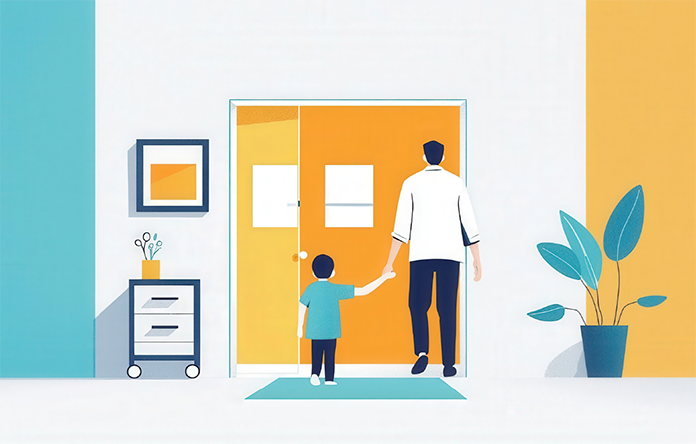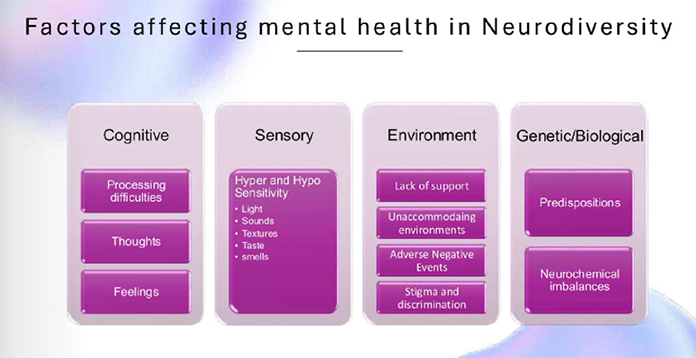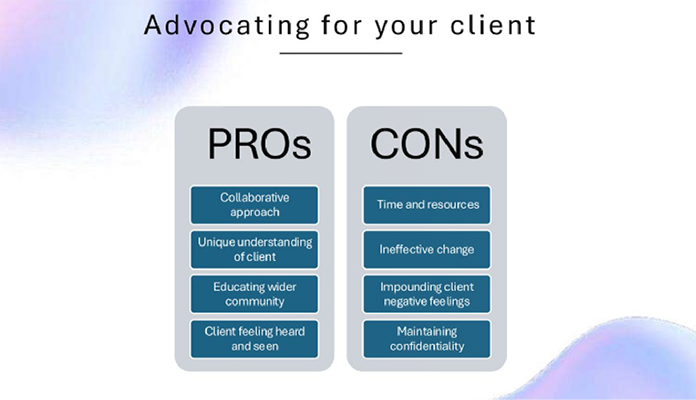
We recently welcomed back Maggie Worth, Integrative Child, Adolescent and Family Psychotherapist, for the next webinar in our sharing and learning series. This time, Maggie discussed practical tips for how to meet a neurodivergent child or young person (CYP) psychologically, in multiple settings, both within and outside the therapeutic space.
Watch Maggie’s first session here.
If you missed the second session, you can catch up here.
For supporting resources, please view the slides below:
Neurodiversity is a natural variation within the human brain, but the important distinction is that it is different, not deficient. These differences make things difficult for neurodivergent individuals within a normative world. However, with a growing neurodiverse population, we need to work to accommodate these differences, within therapy and within the wider environment.
Factors affecting mental health in neurodiversity
We know that within the neurodiverse community, there is a high prevalence of co-morbid mental health difficulties. As many as 1 in 6 neurodivergent CYP in the UK have a diagnosable mental health condition, so within the therapeutic environment, it’s important to recognise that there is also a lot going on in the background for the young person.
Many factors affect mental health for neurodivergent CYP:
- Cognitive – their thoughts and feelings can’t always be shifted, but tailored approaches can help.
- Sensory – they tend to be triggered more by their sensory environment, which can cause distress. Simple adjustments, like changing the light, can make a difference.
- Environmental – Creating a supportive and understanding environment through reasonable adjustments is crucial.
- Biological – biological and chemical imbalances at times of developmental change can exacerbate mental health difficulties. Psychoeducation can help normalise these experiences for the young person.

How can you psychologically meet neurodivergent individuals?
Consider that every neurodivergent CYP is unique and faces their own challenges. Within the therapeutic environment, clinicians can look to build a sense of trust and safety with their client, to help them get the most out of the sessions, and therefore, the best outcomes.
- Make an effort to get to know them. How you see them and how they see you is a core foundational element. Try not to read too much into the referral, instead, work to understand them as a person, for example, their likes, dislikes, strengths and challenges.
- Understand their neurodiverse profile. This involves learning about their traits and how they behave in the room, so you can tailor your support to suit them.
- Show them that you see and understand them. Neurodivergent CYP become so used to masking behaviours, that you need to build an environment where they feel safe and you can get behind the mask. This will help them to see and accept the whole them – their true authentic self.
By following these main steps, you will be empowered to adapt therapy to the neurodivergent individual. This will ultimately show them a level of respect that allows them to open up to you, and for you to give them the toolkit they need to thrive.
Is therapy enough to really improve the mental health of neurodivergent individuals?
Maggie raised a crucial question of whether therapy alone is really enough to improve the mental health of neurodivergent individuals.
Therapists can do a lot of work with one person in a room, however, when the outside world doesn’t change, they are essentially being put ‘back into the frying pan’ – into environments where they are being triggered and struggle to be themselves. The world outside has to become more flexible to complement the progress that individuals make in the therapeutic environment.
Working both inside and outside of the therapeutic space has its pros and cons, but on the whole, educating the wider community and helping the young person to feel seen and heard is a key starting point for supporting the outside world to adapt.

Alternative forms of therapy
Outside of the clinical room, other forms of therapy can also support neurodivergent CYP to understand themselves and experience improved outcomes. For these people, it is important to be able to provide different types of therapy in different settings.
- Social prescribing – offers neurodivergent CYP access to community-based activities and support that caters to their specific needs and interests. This fosters wellbeing beyond traditional clinical settings.
- Therapy around special interests, for example the calming and interactive nature of equine therapy. This can create a motivating and comfortable environment for neurodivergent CYP to explore emotions and develop new skills.
- One to one social mentoring – tailored mentoring supports neurodivergent CYP in understanding social cues and developing social competence
Are you interested in speaking at one of our sharing and learning webinars in the future? Get in touch with us at events@mayden.co.uk.
If your service provides support to neurodivergent individuals, find out how iaptus can support you.
